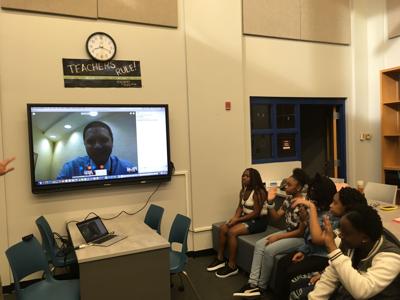A distance learning pilot program launched this school year in Charleston County School District (CCSD), is an effort to create equity and ensure all students have access to classes, especially AP classes.
Ninth and tenth graders at St. John’s High School and Baptist Hill High School are both using interactive technology kits to participate in a year-long virtual learning course, AP Human Geography, with Wando High School teacher Dr. Jason Brisini.
Students are provided opportunities to interact with Dr. Brisini through the course management software using their Chromebooks.
“With the equipment, we are utilizing, we interact as if we are in the same room,” Brisini said. “Students can raise their hand just like a face to face class. It makes everything real for the students and me.”
Distance Education is not new to the District. In the 2013-14 school year, there was an AP course delivered to St. Johns through an older version of distance education using video conferencing. However, it was not as interactive and responsive as the technology currently being used in the Distance Learning Program.
Distance Learning opportunities provide daily “face to face” interaction with a live teacher in a virtual/web-based classroom.
Today’s advancements in technology make distance learning a more interactive experience for the students, according to LaShawna Rivers, Online Coordinator for CCSD. “This is the direction education is going,” Rivers said. “Courses that are not offered in a particular school can now be offered across the district. Advancements in technology allow us to address the issue of equity and access as it relates to course offerings in smaller, rural Title I schools. The success of the program is based on our ability to expand course offerings to meet the needs of students.
Students that wouldn’t normally have the opportunity to take a course can now utilize resources at other schools.”
This program will help to increase enrollment in AP and Honors courses for traditionally under-served students, and provide equitable access across the district to rigorous programs of study.
This technology used in this initiative was initially applied for in the 2017-18 Title IV Federal grant, the grant was applied to at-risk, rural Title I high schools only.
“We were very fortunate to be able to find a perfect fit with Dr. Brisini,” said Rivers. “He has built relationships, and this has helped them become more comfortable with this new format of learning,” said Rivers. “It has been challenging and has opened their eyes to a new way of learning. As a result, they are growing as critical thinkers.”
Brisini runs a project-based, flipped classroom, where unlike a traditional lecture style course, the lessons are pre-recorded and available to students to watch and listen to at their own pace so that they come to class having already watched the lesson. Brisini conducts the virtual class the same way.
“At first we had to navigate and feel each other out,” Brisini said. “The students were not used to a self-directed and self-motivated style of teaching. We hit a few bumps in the road at first, but I could tell from day one that these kids were bright, and we could do it.”
Students have to do a lot of work on the front end; they must be self-motivated and self-directed.
“They can do all work ahead of time, so they come to class prepared and are not just staring at a screen and watching me talk,” Brisini said. “There’s a lot of action going on, and it’s not that different from being in a regular class.”
Since the beginning of the school year, Brisini has seen clear student growth from both the traditional and online class setting.
Baptist Hill and St. John’s students also went on a field trip to Wando to sit in the classroom with the students there to see first-hand that the instruction does not vary from school to school.
“They were answering questions, giving examples that pertained to our topic, and weren't shy about being in here with students they didn't know,” Brisini added. “I could not be more proud of them.”
The District intends to continually expand the Online and Distance Learning options for CCSD students and will consider expansion of the program in the development of the 2019-20 budget. CCSD has also been approved as a S.C. Virtual Franchise district to provide greater flexibility for offering online courses with CCSD teachers serving as instructors.
“The big goal at CCSD is to key in on equity," Brisini said. "We want all kids to have an equitable opportunity, and virtual learning can help bring that to all schools. We're doing a disservice if we don't. Learning from this experience, we know equity is indeed possible for all.”
For more information about Distance and Virtual Learning, contact LaShawna Rivers at lashawna_rivers@charleston.k12.sc.us.

